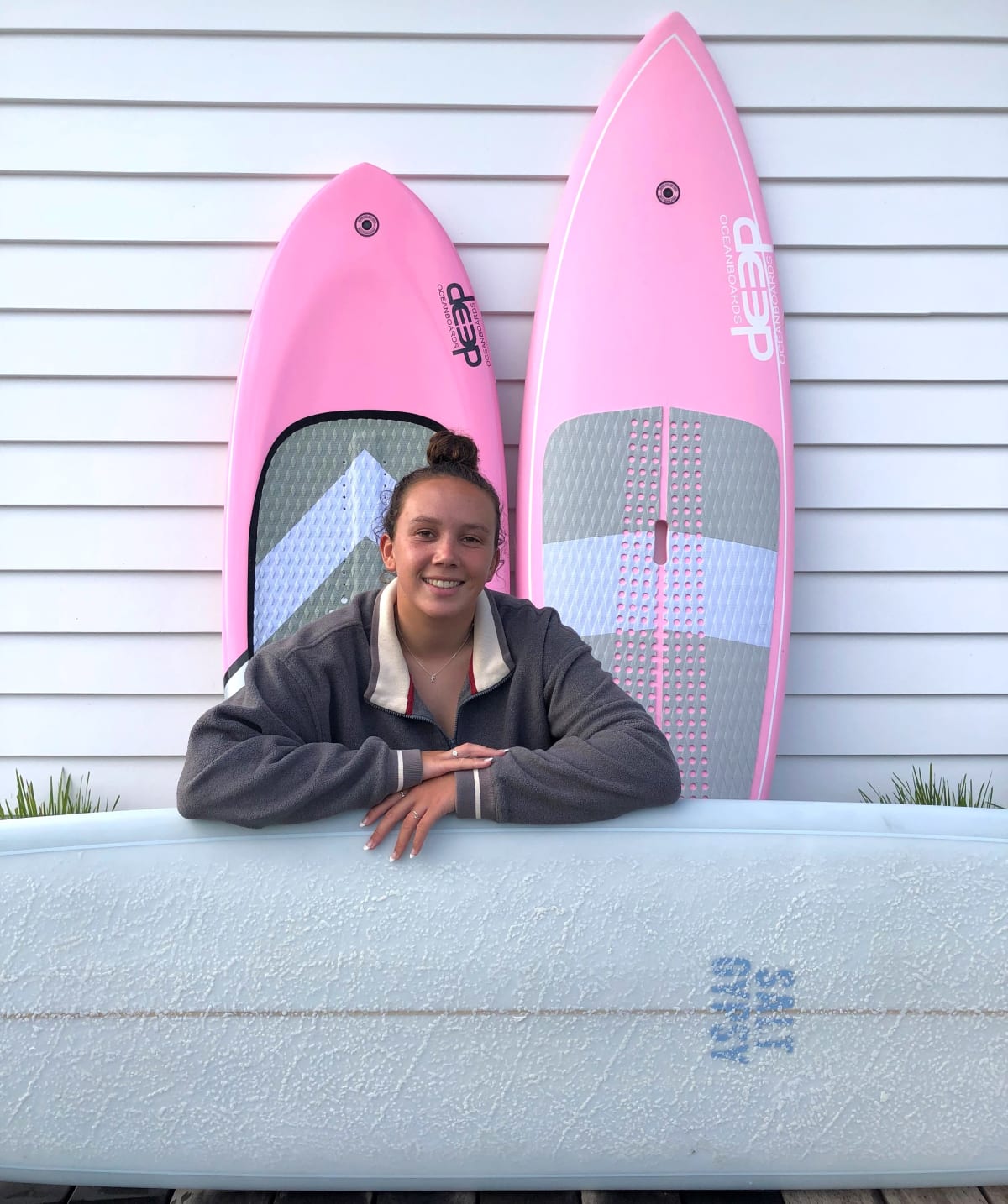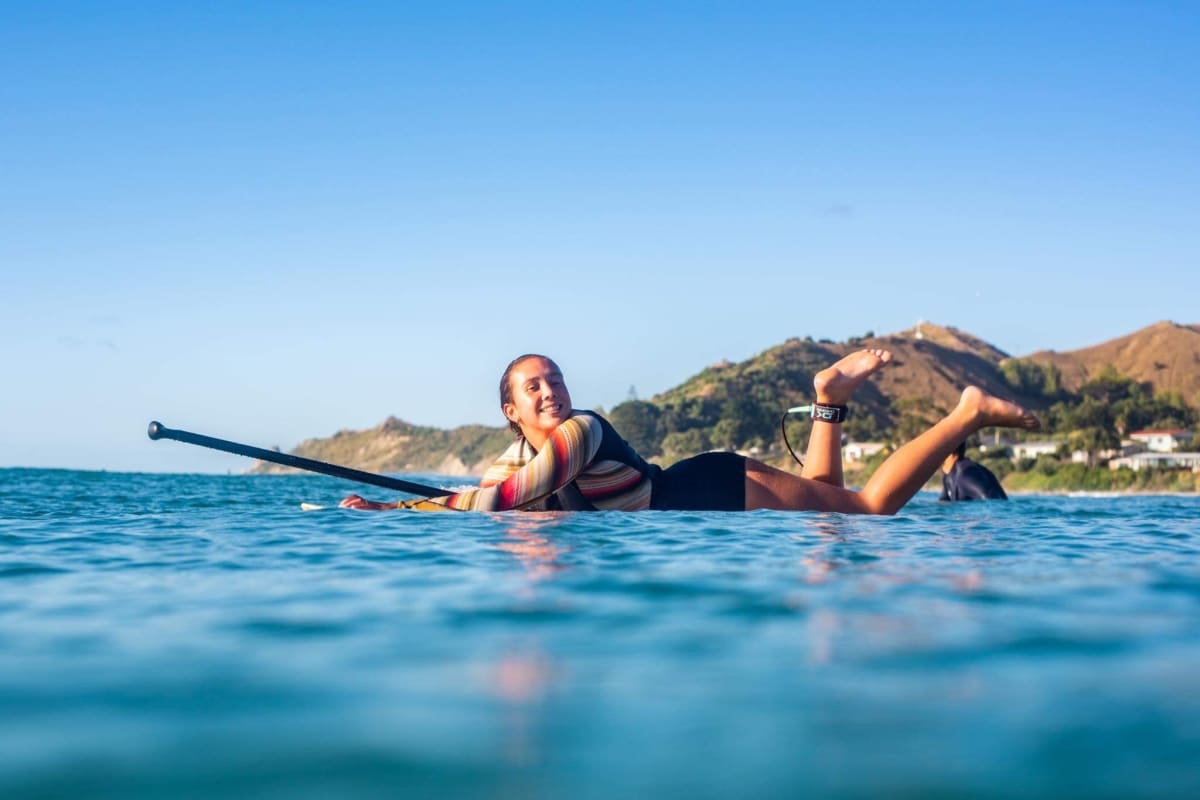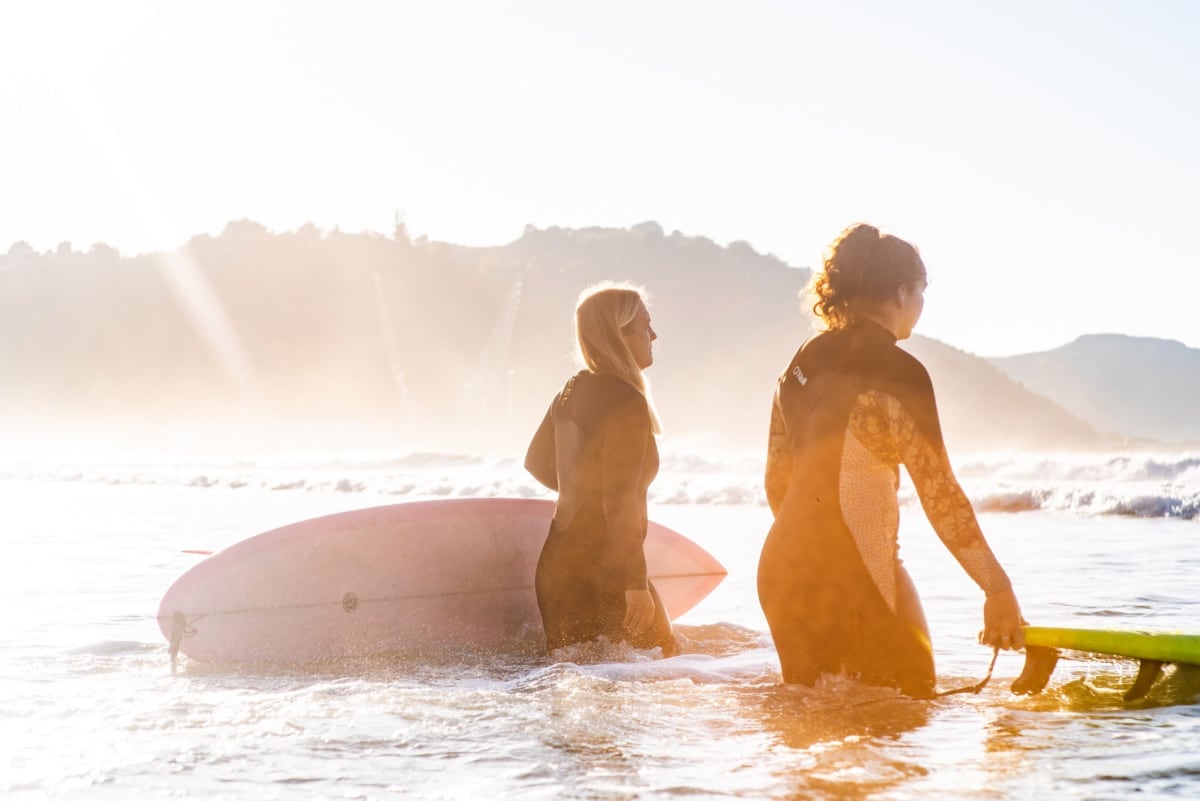
The first Kiwi to win a world championship medal in SUP surfing, teenager Stella Smith sees the lifelong benefits of the sport and is sharing her passion for the waves with females of all ages.
Surfing has taught 19-year-old Stella Smith a lot about life, making her wise beyond her years.
“Surfing teaches you that it’s okay to fall off. You’re going to have setbacks,” she says. “You’re going to have good days and bad days, but the good days make it all worthwhile.”
Those life lessons have helped prepare Smith – the first New Zealander to win a world championship medal in Stand-Up Paddleboard surfing - for the rocky ride of being an athlete during a global pandemic.
Smith, of Rongowhakaata descent, has just qualified to compete at her third world SUP and paddleboard championships, in Puerto Rico in November.
She’s focused on training and keeping a positive attitude despite the ongoing uncertainties in the Covid pandemic. When Covid first hit in 2020, Smith’s hopes of travelling overseas to surf competitions were dashed. “I complained and blamed everyone else for a while,” she says.
Picking herself up and refocusing on her surfing career, Smith is also passing on those lessons to a new generation of girls and women learning to surf the waves of Tairāwhiti Gisborne.
Teaching girls at the Salt Shack Surf School, and mums and older women in her volunteer work with the Gisborne Boardriders club, Smith sees more and more families surfing together.
“The beauty of surfing is it’s a real family sport. The older you get, you can still do it. You might have to make some modifications [like surf a longer board, or opt for smaller waves], but you can still be doing it well into your 60s and 70s. It’s something you can do forever,” she says.
For Smith, there’s no question her love of surfing will be a lifelong passion – whether it’s competitive or not.

Growing up in a family of three girls, much of Smith’s childhood was spent on the beach with her whānau and friends in Gisborne’s Wainui beach community. “Surfing is such a family-oriented and community sport,” she says.
Jasmine, her older sister by five years, has always been a huge inspiration to her. They started together at Wainui Surf Lifesaving Club, Smith participating in the Nippers programme from the age of four. Smith remembers being in and out of the water all day, surfing and playing.
Following in her sister’s footsteps, Smith started competing in shortboard surfing at nine, and then fell in love with the new sport of SUP at 13. She qualified for her first world champs at 15, competing in Denmark in 2017, and the following year surfed at the worlds in China, where she won an historic bronze medal.
All three Smith sisters are New Zealand representatives in watersports. Youngest sibling, Ava, has competed internationally as a surf lifesaver, and Jasmine now lives in Australia with her focus on open water races.
Despite the success of their surfing family, Smith warmly remembers the support of her parents. “They never pressured us. They supported our love of surfing and the ocean in all the ways they could,” she says.
“Dad would pick me and my friends up from school, take us to the beach, and film us so that we could watch and learn after we got out of the water. They gave up so much to support our passions”.
The benefits of action sports for young women
The physical and social benefits of participating in organised, competitive sports are well known. Not only can a young person develop physical skills and competencies, but also important social skills such as teamwork, leadership and work ethic.
But my own research over the past 15 years also clearly shows the many benefits of informal sports participation, including action sports like surfing, skateboarding, climbing, mountain biking, BMX riding and parkour.
In Women in Action Sport Cultures, a book I co-edited with Dr Rebecca Olive, we brought together 30 international researchers with various projects highlighting the many social and physical pleasures, skills and competencies of girls and women participating in informal action sport cultures and communities.
Stella Smith grew up playing netball and soccer but was ultimately drawn to surfing because of its family environment. “We would all spend time together at the beach. It’s just the best lifestyle,” she says.

In contrast to organised sports like netball and soccer, many informal and action sports are not based on head-to-head competition. Rather than winning, the core motivation is fun, participation and individual skill development, whether its learning how to ollie a skateboard, paddle into and glide across the unbroken face of a wave, or navigate a Grade 3 mountain bike trail.
These informal sports offer unique opportunities for girls and young women to gain a sense of achievement without having to compete against, and beat, another opponent.
Participants can learn alongside one another and gain a sense of accomplishment based on their own skill development. Appropriately supported, informal sports can offer ample opportunities for individual empowerment through skills mastery (co-ordination, balance), as well as valuable social skills (communication, sharing of social space, understanding difference, social connection and belonging).
Many traditional sports have coaches who organise training, motivate players and provide feedback. While coaches are becoming more common in some action sports – with the recent Olympic inclusion of surfing, skateboarding, sport climbing (and more to come) - peer mentoring remains the most common mode of learning.
Peer groups provide important feedback, support and motivation as girls and young women learn new skills together. The peer group organises times to meet and participate together, and there’s joy for young women in having autonomy over their own sporting and fitness in terms of when, where and with who they participate.
Buddies and body image
For Smith, it was surfing with her sister and another top Kiwi surfer, Saffi Vette, that helped her feel confident in the waves.
She talks about the importance of always having a buddy in the surf - if you fall off or come up from a big wipe out, “as soon as you see your buddies, you’ll just laugh it off”.
Smith also acknowledges the importance of older women surfers in her local community, such as national champions Holly Quinn and Ainsley Guinness. They paved the way and showed that girls can surf really well, Smith says, but also that you don’t have to “look like a stick figure” to be a strong surfer.
Like many young women, Smith admits to struggling with body image issues during her teenage years, but in surfing found positive role models of women who embraced their own unique physiques.
“They were musclier and they surfed amazing. I grew up looking up to these amazing women of all different body shapes, and that gave me confidence in my own body too,” she says.

Most organised sports also require referees to control the play and discipline the players on the field. In contrast, many informal and action sports are self-regulating, and participants often quickly develop an implicit understanding of the cultural etiquette for sharing the space.
Young people learn to respect and understand difference through everyday interactions in shared spaces (a skatepark, a mountain bike trail, in the line-up at a local surf break) with participants of different skills levels, ages, ethnicities and genders.
While Smith appreciates the opportunities surfing competitions have brought her —to travel, meet new people, learn about different cultures — it’s the surfing community and the healthy lifestyle that remains her core motivation.
Sharing the stoke
Over the past two summers, Smith has been coaching with Salt Shack Surf School, co-founded by her longtime friend and role model, Holly Quinn, and her brother, Jay. Both national champions, the Quinns have a long history in surfing, focused on sharing the ‘stoke’ with the wider community.
While the programmes target a range of groups, including mums, Smith loves working with the groups of girls and young women.
“We have a really good group of young girls coming through. Our approach is all about fun. We’re not super-strict,” she says.
“We play games on the beach and then they go surfing with their friends. They cheer each other on and laugh when they fall off.”
The numbers of girls and young women flocking to surfing has seen the Salt Shack needing to add extra ‘girls-only’ sessions.

Informal sporting cultures can also offer unique opportunities for young women to find their own versions of empowerment.
As well as expressing themselves through movement, in action sports like surfing or skateboarding, they’re also able to wear what they want and in ways that they feel best express their sense of identity.
Research has consistently shown young women are put off by the limitations of many sports uniforms.
Struggling at times with body image, Smith found she didn’t always feel comfortable in netball skirts and soccer uniforms. That aligns with the new Sport New Zealand campaign, ‘It’s My Move’, focused on encouraging young women into sport and physical activity - in times, places, with friends, and wearing clothing of their own choosing.
While most traditional sports divide men and women into two separate and distinct groups, in many informal sports, girls, boys, men and women often share the same space (the waves, a skateboard park, an indoor climbing facility).
Sports like skateboarding and parkour do not explicitly privilege the male body (speed, upper body strength, physical force) as sports like rugby do.
The gender-neutral traits of balance, coordination, personal style and the creative use of space are highly valued, so boys and girls don’t need to be separated and can learn to respect one another and enjoy participating together.
It hasn’t always been this way in surfing, and Smith appreciates the efforts of previous generations of women. She’s found the older male surfers in her community are really supportive. When she took up SUP, there weren’t many women doing it, but there were men who encouraged her along the way.
She also brings a positive attitude to any surf session: “Be kind and always say hello, and no one will bother you”.

Surfing has also helped Smith develop a respectful relationship with the ocean: “It’s taught me a lot about the environment: wind, currents, tides. And it’s always changing. No two waves are the same.”
Today, girls and young women also have incredible role models in these sports (like 13-year-old surfer and skateboarding Olympic bronze medallist Sky Brown), that motivate the pursuit of healthy lifestyles through these activities. Girls and young women are increasingly turning to social media to find inspiration and learn new techniques and skills from their favourite athletes.
Smith took inspiration from the growing visibility of women surfers on the World Surfing League. Her favourite surfer is American Carissa Moore. “I’d watch her and think ‘You can do the same thing’,” she says.
“I use social media a lot to inspire my surfing, especially in SUP, where there weren’t many young women doing it initially”.
Now Smith is a role model for young surfers in her community. “It’s weird to think about being a role model, but I’m trying to show girls that it’s all just about having fun. It’s okay to have fun, to fall off and try again,” she says.
“It’s okay to be having fun at the beach with your friends, but also that you can step outside your comfort zone and push yourself. But that’s better with your friends around you.”







